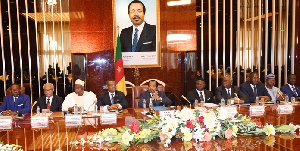How much is a life worth? The amount of the person's salary? The amount of at least 15 other salaries? The closure of a stadium? The suspension of a club? Or the halting of a football league as a whole?
The Algerian Football Federation has decided that Albert Ebosse's life was worth all of that and more.
Following his death, caused by a head injury after he was struck by an object hurled from a fan, administrators have ordered several sanctions designed to remember the Cameroonian forward, ensure his family is not left destitute and try to investigate why his life was lost and how further tragedy can be prevented.
Ebosse's relatives will receive the amount he would have earned over the remainder of his contract as well as a month's salary donated by each of teammates and $100,000 from the governing body.
Just two matches into the season, the league will be stopped, the 1st November 1954 stadium will be closed indefinitely and an inquiry will begin into both the incident that ended Ebosse's life and hooliganism in Algerian football as a whole.
The facts of the matter are this: Ebosse was an up-and-coming player who had represented his national under-20 side and appeared to be building his profile to challenge for national selection.
He was leading scorer in the Algerian championship in the 2013-14 season after netting 17 times and had scored the only goal for JS Kabylie in their home defeat to USM Alger. As he was leaving the field, he was hit by a projectile and taken to hospital, where he was declared dead on arrival.
It has been reported that the object was a rock, as there was some construction taking place at the stadium. Why a venue, which was undergoing maintenance, was open for business will be one aspect of what the ministry of the interior will question, but it should not be the main one. Rather they need to concentrate on why, even if the area was strewn with rubble, someone saw fit to use it to cause harm.
That is what Ebosse's family will want to know and that is what CAF president Issa Hayatou wants to know. "African football cannot be the breeding ground for hooliganism whatsoever," Hayatou said in a statement. "We expect exemplary sanctions to be taken against this grave act of violence. Violence has no place in African football in particular and sports in general."
The truth is that Africa has been asking about this for years, spanning a scale of disasters that have ranged from the 2001 Ellis Park stampede, which killed 43, to the Port Said stadium disaster, in which 79 people lost their lives.
When the victims are members of the crowd, a lack of security or a lapse in logistics have most often been fingered as the cause. But when the perpetrators of the wrongdoing are making a statement, such as the example of the attack in Angola on the Togo team bus ahead of the African Nations' Cup in 2010, a different type of investigation must take place.
This incident may lead Algerian officials to question what the root cause of the unhappiness is. It may be linked to the ongoing aftershocks of the Arab Spring, in which, in Egypt especially, football was used as a political tool far more than it was considered a game. It may also bring back into focus the importance of sport as a tool on a continent grappling with change.
Whatever answers they come up with, Algeria will now surely be out of the running to replace Libya as ANC hosts in 2017, following the latter's withdrawal. Ethiopia has entered the fray as a possible candidate for that event.
That also provides another clue as to how much a life is worth. An opportunity to bear witness to some of the best on the continent, an entire tournament and, quite possibly, a country's reputation.
Sports Features of Friday, 29 August 2014
Source: espnfc.co.uk













